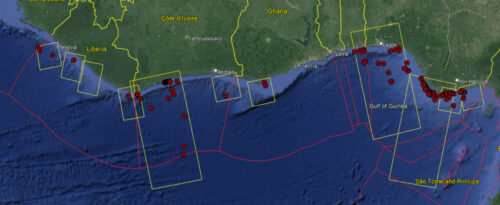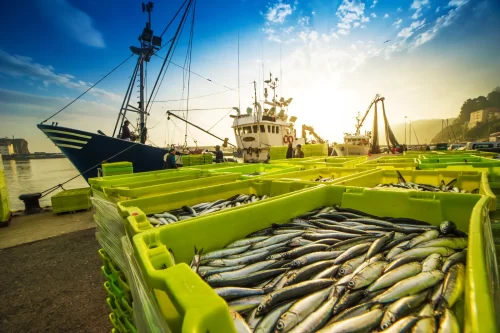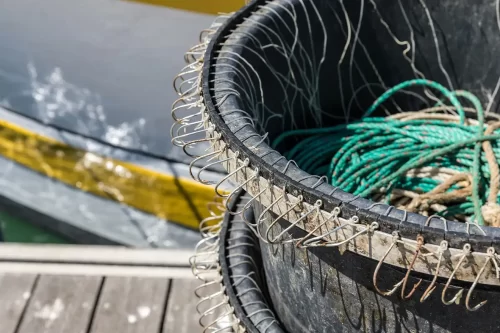Global Fishing Watch discusses the use of technology at the first ever Ocean Risk Summit, Bermuda 8-10th May

I was very pleased to be invited to the first ever Ocean Risk Summit in Bermuda last week. Re-insurer XL Catlin gathered leaders from across the political, economic, environmental and risk sectors to identify potential exposures to the effects of a rapidly changing ocean and propose how to respond to their broad-ranging consequences.
The insurance sector has long been at the forefront of efforts to assess the multitude of risks from climate change. The growing need to understand the specific impacts of ocean change provided the impetus for the Ocean Risk Summit.
The event presented high-level speakers providing expert data, analysis and innovative tools with an ambitious goal: to generate new and dynamic solutions to Ocean Risk across several themes; Our Changing Ocean; Managing and Reducing Ocean Risk; Building Resilience; and Applied Solutions.
The ocean’s role in supporting life on earth is in jeopardy
With such a diverse attendance the scene had to be set. The ocean is changing faster than at any time in the past 65 million years. This has implications which threaten economies, cultures, societies and our environment.
It was made compellingly clear that the ocean’s role in supporting life on earth and its potential to drive sustainable economic growth are being jeopardized because of the risks borne out of ocean change. Leaders in politics, policy-making, finance, environmental management, technology, risk management, law and regulation need more information about the challenges that ocean change presents in order to help define and quantify the risks involved. That way effective mitigation and adaptation strategies can be formed to shape a more sustainable future for the ocean and all who rely on it – that is, all of us.
Government, policy makers and other stakeholders can do much to build resilience in the ocean and in societies as they face the impacts of change. New approaches will help nurture sustainable development. Effectively addressing ocean risk requires a multi-sectoral approach. Technological advances in collecting ocean data now make the assessment and management of ocean risk feasible, providing the opportunity to develop innovative and scalable solutions. New financial instruments will also drive the mitigation of ocean risk.
The role of technology in mitigating risk in the fisheries sector
Global Fishing Watch (GFW) has a clear role to play as part of this urgently needed response. I was asked to co-host two working groups on How can technology mitigate the risks associated with IUU fishing and increase transparency; and what role does/should the industry play in addressing these issues?
The explanation of our mission was warmly received. ‘Advancing ocean sustainability through increasing transparency for responsible ocean stewardship’ is a message that goes to the heart of what is needed – how to use data to identify risk, and incentivise responsible action. There are clear ways in which GFW’s work, and future developments from it, can assist the insurance sector to drive transparency and better utilise technology.
Firstly, to monitor the ocean, as vast as it is, will not happen without proper exploitation of technology. To achieve this efficiently needs a transformational change in approach, I explained, which must draw on leadership beyond the traditional sectors. The Ocean Risk Summit had a clear role in boosting this cross-cutting dialogue. Transparency and data sharing should be a central tenet of ocean sustainability – to help in understanding where the risks lie.
GFW vision for rewarding compliance in fisheries well received
Secondly, by expecting transparency from actors benefitting from marine resources, the burden is reversed. Instead of authorities expending effort and money trying to prove illegal or illicit activity, it is the fishing operators who must provide proof of compliant activity. They can then be rewarded for it with enhanced access conditions. Vessels should be mandated and expected to share their position through AIS, VMS or other systems – publically.
There was strong support among the insurance audience and those charged with protecting our ocean via the more established methods of enforcement and monitoring for the tenet that transparency will breed self-correcting behaviour.
The vision is for data to allow ports to rapidly understand a vessel’s activity and reward compliant vessels with swift landings and minimal delays. It means vessels that we know to be compliant can continue to fish responsibly. Those that arrive in port with a patchy history, and no clarity to their actions, can be easily identified by port authorities and placed in the queue for further inspection. This is costly to the non-compliant fisher but efficient for the port. Governments and buyers can benefit greatly by demanding transparency. It is a simple and cost effective ask that authorised vessel lists are made public along with the vessel tracking – AIS, VMS or other systems. It means good behaviour is rewarded, monitoring is cheaper and more effective, and bad actors stand out more clearly and can be penalised appropriately.
This approach was well received. The discussion evolved in the working group to consider identifying other incentives for fisherman to embrace transparency. Could the way vessels are insured incentivise transparency? Setting clear conditions for insurance or by reducing premiums for those that are ready to evidence compliant and responsible behaviour through transparency could be a way forward.
The High Seas were also part of the discussion, very topically given the upcoming IGC meeting at the UN on a new legally-binding treaty for the use of biodiversity beyond national jurisdictions. The sense was that this is a common resource, so what is taken from this vast area must be public information. Can this be built into insurance mechanisms that are seeking to protect the resilience of our ocean?
Open data key to building knowledge
Over the course of the two day meeting, it was made abundantly clear how important science and research is to meeting the challenges of ocean risk. Much of the conversation was about evidence as the key to proper assessments. Open data was raised as an important factor. I was pleased to be able report that research is central to GFW and that we have the Research Accelerator Programme and are ready to expand our research partners. The value of shared information and openness in sharing data is a vital driver to change. And that open data is fundamental to our thinking.
The first Ocean Risk Summit has catalysed important cross-sectoral dialogues and made clear that the will is there to embrace the challenges ahead. GFW stands ready to work with as many stakeholders as possible in shining a light on what is happening in our ocean, both to reduce risk, and build adequate responsibility in stewarding its vast resources.
You can read a fuller summary of the Ocean Risk Summit here and videos of keynote speakers.


